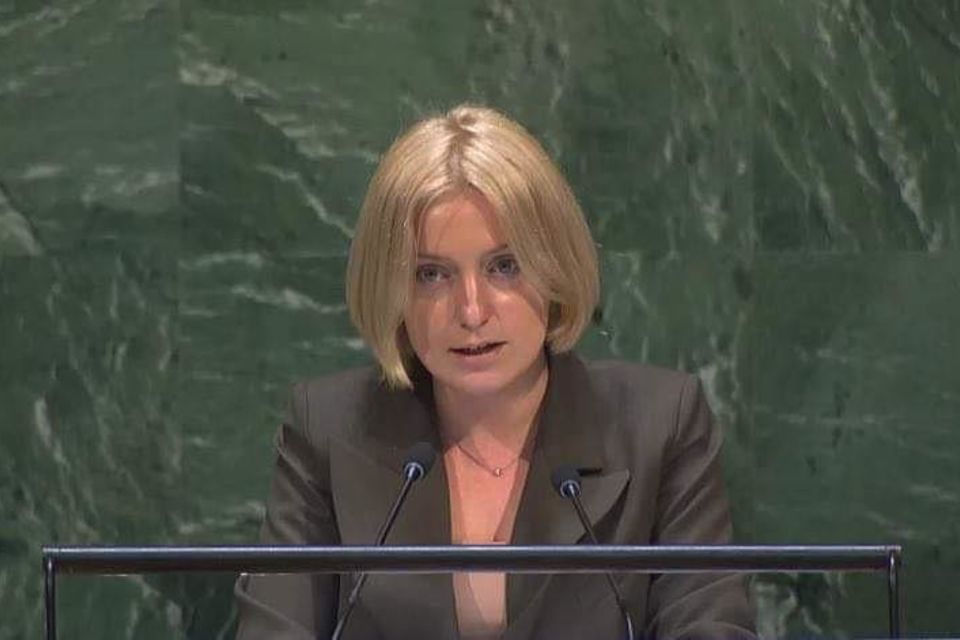Statement by the delegation of Ukraine at the UNGA plenary meeting on the oceans and the law of the sea

Mr. President,
Excellencies,
Distinguished delegates,
The Delegation of Ukraine aligns itself with the statement delivered by the Delegation of the European Union and would like to make a few remarks in its national capacity.
Today Ukraine is pleased to join many others in co-sponsoring draft resolution entitled “Oceans and the law of the sea”. We would like to express our appreciation for the excellent stewardship demonstrated by the facilitator of the resolution.
Mr. President,
Despite the progress made by the international community to address the challenges facing the oceans, the health, resilience and productivity of the oceans continue to deteriorate. Moreover, increased cumulative impacts of human activities have led to an unprecedented decline in marine biodiversity and in the health of marine ecosystems. Thus, it is of paramount importance to pay more attention to these problems and take concrete steps to address them. We would like to echo the latest report of the UN Secretary-General on the Oceans and the Law of the Sea, which emphasizes that the international cooperation is crucial for success in addressing the challenges facing the oceans, including those of the people who depend on the oceans.
We acknowledge the need for enhancing ocean governance as a cornerstone for preserving and protecting the marine environment and biodiversity, as well as ensuring peaceful relations between States.
The UN Convention on the Law of the Sea establishes the overarching legal framework within which all activities in oceans and seas must be carried out. By setting out a legal order for seas and oceans, the Convention continues to contribute to the peace and security, cooperation and friendly relations among all nations as well as to sustainable development.
The Convention requires States parties to settle any dispute between them concerning the interpretation or application of the Convention by peaceful means. Consistent with Article 33 of UN Charter and Article 279 of UNCLOS, Ukraine has striven to peacefully resolve its dispute with Russia.
Since early 2014, Russia has engaged in numerous blatant violations of Ukraine’s rights under the UNCLOS and other relevant rules of international law: unlawfully excluded Ukraine from exercising its maritime rights in the Black Sea, Sea of Azov, and Kerch Strait; exploited Ukraine’s sovereign resources in those waters for its own ends; and has usurped Ukraine’s right to regulate within its own maritime areas in those waters.
Through these violations of international law, Russia is, among other things, stealing Ukraine’s offshore hydrocarbons and fisheries resources, harming the livelihoods of Ukrainian fishermen, and interfering with navigation, including the navigation of vessels heading through the international Kerch Strait and toward Ukraine’s Sea of Azov ports.
On 16 September 2016, Ukraine served on the Russian Federation a Notification and Statement of Claim under Annex VII to the UNCLOS referring to a dispute concerning coastal state rights in the Black Sea, Sea of Azov, and Kerch Strait.
On 19 February 2018, Ukraine filed a Memorial with the UNCLOS Tribunal establishing that Russia has violated Ukraine’s sovereign rights in the Black Sea, Sea of Azov, and Kerch Strait. On 31 August 2018, the Tribunal hearing Ukraine’s case against the Russian Federation under the UN Convention on the Law of the Sea published a procedural order determining that it would rule on certain jurisdictional objections raised by the Russian Federation in a preliminary phase of the proceedings. Ukraine does not believe that the Russian Federation’s jurisdictional objections are plausible or that they will be accepted by the Tribunal.
Moreover, on 25 November 2018 Russia engaged in a new wave of violation of the UNCLOS by blocking, attacking, detaining and seizure of Ukrainian military vessels in the Black Sea and near the Kerch Strait. Such actions constitute grave violation of UNCLOS provisions that regulate territorial waters, international straits and exclusive economic zone. On 1 April 2019, the Ukrainian Party, in accordance with the United Nations Convention on the Law of the Sea, notified the Russian Federation about a dispute concerning the immunity of three naval vessels and 24 servicemen on board.
According to the Order of the International Tribunal for the Law of the Sea of 25 May 2019, Russia was obliged to immediately return these vessels to the custody of Ukraine. It took Russians almost half a year for such a return.
Today Russia continues to violate UNCLOS denying the immunity of the servicemen and continues to prosecute them based on actions taken while they were on board the Ukrainian naval vessels.
On 21 November 2019, the procedural hearings by the Arbitral Tribunal under Annex VII to the UN Convention on the Law of the Sea in the case concerning the immunity of three Ukrainian naval vessels and their twenty-four servicemen on board took place. Immunities of warships are the fundamental principle of international customary and maritime law. Nobody has the right to violate it, and in case of violation one should bear full responsibility.
In this regard, we call upon the Russian Federation to comply with the international law and implement UNGA resolutions, and to return unconditionally and without delay all equipment and weapons seized from the released vessels the Berdyansk, the Nikopol and the tugboat Yani Kapu to the custody of Ukraine.
Mr. President,
We would like to stress that much greater efforts are necessary by Member States to achieve the targets of Sustainable Development Goal 14, including through enhanced international cooperation and coordination, and increased capacity-building, and transfer of technology to developing States and that, in order to be cohesive, effective and longlasting such efforts must be undertaken within the context of the legal framework set out by the UNCLOS.
In conclusion, we would like to express our gratitude to the Secretariat and to the Division for Ocean Affairs and the Law of the Sea for their work and constant support during the year.
I thank you.
